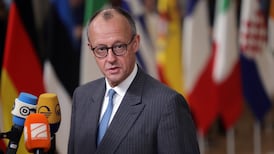President Michael D Higgins and Taoiseach Enda Kenny will join Pope Francis and leaders from around the globe today in New York to ratify the Sustainable Development Goals (SDGs) at the United Nations General Assembly.
These global goals, which replace the Millennium Development Goals, are designed to end extreme poverty, fight inequality and injustice, and combat climate change by 2030.
"We want to get away from the sense that some parts of the world are superior to others," said David Donoghue, Ireland's permanent representative to the UN who chaired the negotiations for the global goals with Macharia Kamau, Kenya's UN representative. "We're trying to remove the idea that certain countries are fully developed and others are totally underdeveloped. Education, health, looking after the environment, creating food security: all these things are interlinked. In the simplest word, sustainability means creating something lasting."
Implementing goals
As co-chair in the SDGs negotiations,
Ireland
now has a responsibility to lead the way in implementing the goals at a domestic level, said Trócaire executive director Éamonn Meehan. Ireland must respond to today’s summit by setting out a “clear timeline” to achieve our commitment to spend 0.7 per cent of income on overseas development, he added.
“A key question that remains unanswered is how progress on the global targets is going to be funded,” said Mr Meehan. “The World Bank estimates that the SDG targets will take trillions to implement, far in excess of what governments have currently pledged.”
Mr Meehan cautioned that proposals to finance the goals by clamping down on tax loopholes to stop illicit tax flows and by placing a minor tax on international financial transactions were not being implemented by world leaders who instead are turning to the private sector for support in filling the financial gap.
“There are significant concerns that heavy reliance on the private sector is neither adequate nor appropriate to ensure the delivery of outcomes that governments are ultimately accountable for.”
Chief executive of Oxfam Ireland Jim Clarken says the key to implementing the goals is to welcome the world's richest people to get "back in touch with the rest of society, rather than allowing them to exist on the margins of privilege". He added that the participation of women, as well as the world's most vulnerable and marginalised, was vital in realising the goals.
“The goals are achievable, but it cannot be business as usual. Governments – rich and poor – must defy vested interests that seek to maintain the status quo at the expense of people and the planet,” said Mr Clarken. “If implemented correctly, these goals will have an impact on everyone in Ireland – in terms of better public services, fairer allocation of resources to the most vulnerable and more focus on protecting the environment.”
He said that we can be the first generation to eradicate extreme poverty and the last that can avert catastrophic climate change.













